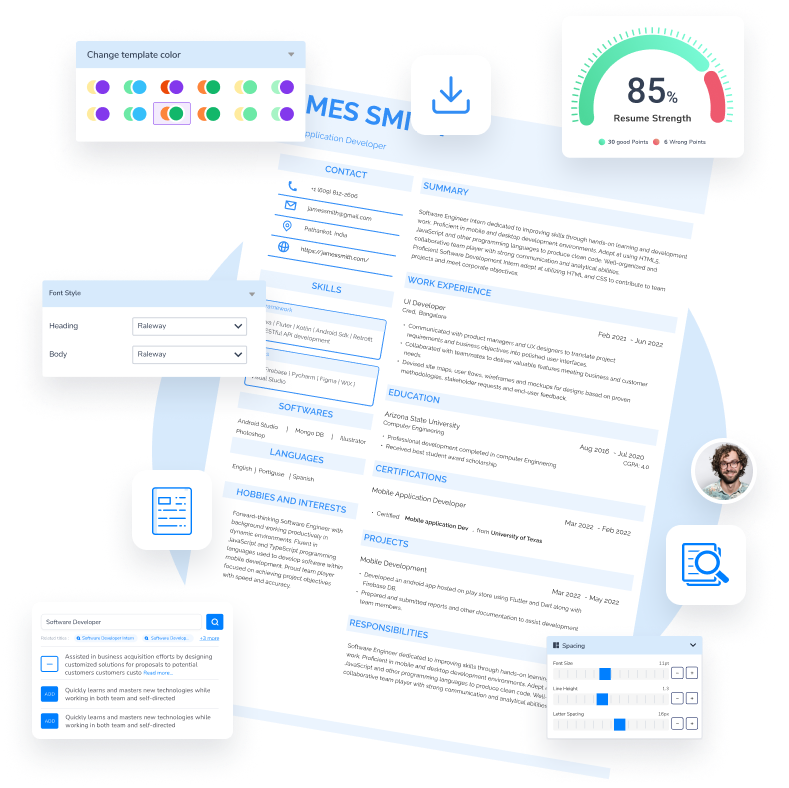Soft Skill in Resume: Top 15 Best Examples to Include
5 Min read

There are specific abilities you'll need to achieve in order to succeed in your career. You could need to be an excellent writer, comprehend mathematical formulae, or be knowledgeable about specific computer programme depending on your work.
These are considered "hard skills." Hard skills are tangible, quantifiable abilities that frequently call for training to learn.
In contrary, "soft skills in your resume" are competencies that are harder to quantify but which yet enable recruiters to distinguish between candidates effectively.
It should be no surprise that hiring managers seek out candidates who can complete the task at hand and collaborate with others.
Your soft skills matter because of this. But precisely what are they? How should they be listed on a resume?
All occupations look for soft skills, which are a collection of interpersonal, social, and communication abilities, moral qualities, attitudes, and perspectives, as well as emotional and social traits.
Although they are transferable, soft skills generally can't be learned through regular education or are notoriously difficult to learn.
Why does that matter? Simply put, transferrable talents are not occupation-specific. No matter what kind of work you do, you have them.
Stanford Research Institute International and also the Carnegie Melon Foundation performed research with Fortune 500 CEOs and discovered that just 25% of long-term job success is dependent on technical knowledge, while 75% of it is dependent on soft skills.
Soft skills have always been the underdog and are frequently written off as being a bit too "fluffy" for most people.
However, we wager that every reader of this article can name a specific workplace mistake or issue that might have been prevented or resolved with the right set of soft skills.
For example, if a hiring manager must choose between a highly qualified applicant who demonstrates emotional intelligence, communication skills, and immediate likeability, and a very socially awkward but similarly qualified candidate.
Try to guess who the manager will wish to hire. See what I mean? Employers now more than ever place a premium on soft skills due to the rise of hiring for attitude.
Any company's success in the workplace is fuelled by its employees' soft talents. Soft skills are what enable team members to work together productively and produce beneficial outcomes.
Emotional intelligence and inherent capacity for interpersonal communication are related to your soft skills.
They are helpful for various types of jobs and businesses. Technical know-how and other job-specific expertise are referred to as "hard skills" and are acquired through school or training.
People can be quickly trained to use new software or carry out specific job-related duties. They cannot, however, be taught common sense. or alter their personality. Soft skills and hard skills differ in this way as well.
Hard skills may be taught and tested. They can be picked up on the job, in the classroom, or through a variety of certifications and courses.
Your interpersonal abilities, or "soft skills," depend largely on your character and the surroundings you grew up in.
Possessing strong communication abilities may be advantageous in your work and during the interview process. Knowing how to speak to people in various places or situations is part of being able to communicate.
When working on a collaborative project, for instance, you can be needed to speak when you think an idea or procedure is ineffective. Employers place a high importance on the ability to disagree with co-workers in a professional setting without escalating tensions.
Your capacity for adaptation demonstrates how effectively you can accept and cope with change.
Companies and workplace are continually changing as a result of the hiring and firing of team members, the buying and selling of businesses, and other factors. You must therefore be able to adjust to a variety of scenarios at work.
Employers are constantly on the lookout for applicants that excel in teamwork. Your ability to work successfully in a team and complete tasks efficiently depends on your teamwork abilities.
In fact, occupations in market research, event planning, and software engineering all require a strong sense of teamwork.
Although we frequently associate creativity with disciplines like art or design, the phrase actually refers to a wide range of abilities, from questioning to exploring.
As a result, any profession can use creativity in the same way that artists do.
Your capacity to work effectively and productively by managing your time is referred to as time management skills.
This soft ability is valued by most companies, but it's crucial whether you're a project leader, corporate executive, or work in the domains of loss prevention or law.
No matter what sector you work in, you always have two options when anything goes wrong: complain or take action. Companies are looking for problem solvers who really can gracefully manage unforeseen hurdles and develop solutions.
The capacity to do jobs and obligations in a timely, effective manner is referred to as work ethic. Even while you are still learning the technical aspects of a new profession, a strong work ethic ensures that you build great relationships with your boss and co-workers.
Many businesses would prefer to deal with someone who is driven and has a great work ethic over a talented worker who lacks motivation.

Try Now for Free!







